A much-needed vaccine for herpes simplex virus 2 (HSV-2), which is responsible for genital herpes and increases the risk of HIV transmission, has shown promise in early animal studies.
Publishing their findings in PLOS Pathogens, researchers developed an HSV-2 vaccine that targets three glycoproteins (proteins coated in sugar-like molecules) on the shell of the virus, specifically those known as gC2, gD2 and gE2.
Recent disappointing HSV-2 vaccines have targeted only gD2, which helps the virus break into human cells. GC2 and eE2 block components of the immune system’s response to the virus, helping the virus persist in the body.
Given to macaque monkeys in three doses spaced a month apart, the vaccine prompted a strong immune response, including antibodies against all three glycoproteins in both blood and vaginal secretions.
In experiments conducted in lab dishes, the researchers found that these antibodies did a very good job of neutralizing HSV-2’s ability to spread between cells. Additionally, the vaccine led to a sharp rise in CD4 immune cells.
Experiments in guinea pigs showed that the vaccine almost completely protected them against genital lesions. Small amounts of viral DNA were still detected in their genital secretions, but just a tiny amount was capable of replicating in cells.
The investigators are currently in talks with pharmaceutical companies to move their vaccine, or an improved version of it, into human trials.
To read a press release about the study, click here.
To read the study, click here.







Comments
Comments